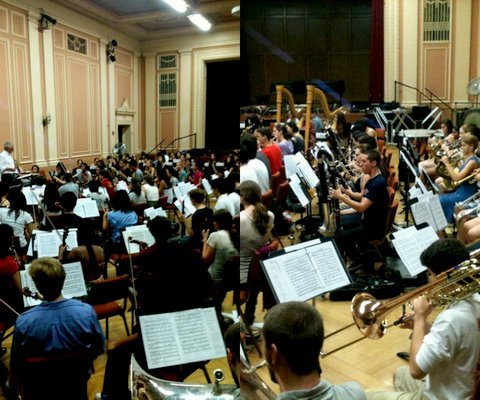
NEC Preparatory School, Youth Philarmonic Orchestra plays Mahler 9th Symphony.
I recently visited at the New England Conservatory’s Preparatory School, one the largest programs of its kind in the nation, and one of the most successful in teaching a wide range of students: from 7-year-old beginners to high school seniors considering professional careers in music.
The breath and scope of the work being done at the school is admirable. The level of musical excellence, virtuosity, and engagement, as portrayed by Benjamin Zander’s Youth Philharmonic Orchestra, is a shining example of what is possible when artistic and pedagogical goals are in alignment with a philosophy of teaching that fosters individual growth while focusing on the benefits of mutual collaboration.
A true youth orchestra, the technical proficiency of these musicians is astonishing. They are constantly searching for beauty in their playing. There is a culture of orchestral playing here that is very desirable, one that focuses primarily, on playing with energy and passion; and rigorous precision.
In hearing this orchestra, I was reminded of the musical results being produced through El Sistema, the national network of youth orchestras of Venezuela. And more specifically, of the work of the Teresa Carreno Youth Orchestra, one of their flagship youth orchestras.
I am not in the habit of making comparisons, but it in the spirit of examining best practices, it would be interesting to explore how these programs are able to achieve similar musical results.
There is something very positive to be said for the notion of establishing networks of advancing orchestras. In Boston, the preparatory school offers admission (by audition) to close to a dozen orchestras at different levels within the scope of their entire program. These range from beginner orchestras that focus on basic technical aspects of playing to advanced orchestras capable of playing complete Mahler symphonies.
Here, musical excellence and advancement is constructed through careful pedagogical planning and in instilling a sense of motivation among all members of this community. Students can grow musically over the course of many years.
This model is something to keep in mind as the El Sistema movement in the United States grows. Crafting a repertoire track that is consistent across programs and establishing opportunities for young musicians to aspire to higher levels of musical attainment will be an important step to facilitating a movement that is both successful and organic.
Although, I am deeply aware that El Sistema in Venezuela is first and foremost a social program, aspiring to produce orchestral playing that is up to par with some of America’s best private music preparatory programs, must also be on our list of priorities.
Social change should be construed through musical excellence. The democratization of music education requires this. As Jose Antonio Abreu contends, we must always strive to music-making without limitations.
In many ways, we can also learn from our nation’s long history of musical pedagogy and our conservatories’ time tested models of success. Throughout the country, there are clear systems of teaching and learning in place that we could all benefit from.
Our challenges are not musical, nor pedagogical, but rather foundational. What if we could convince every professional orchestra in the United States to contribute in the creation of a community youth orchestra from the bottom up? There would be as many youth orchestras here as there are in Venezuela. Communities would thrive and social capital would be increased; classical music would be perpetuated and carried through the next generations. Over the years, the number and diversity of our concert audiences would increase dramatically.
Providing equal opportunities for young people to aspire to musical excellence, regardless of socio-economic or geographical limitations, is something El Sistema has already shown us. We must react quickly, there is much to be done.
Acknowledgments:
Many thanks to Benjaming Zander, Leslie Wu Foley, and Rebecca Bogers, for hosting me at the NEC Preparatory School. It is a privilege to witness the beauty of your work.
Coming up for the Fellows:
-Participating at Boston's annual Rodman Ride for Kids to benefit at-risk youth.
-In Residence at the Conservatory Lab Charter School, Boston
-Workshop collaboration at Longy School of Music, “Enacting a Teaching Practice Through El Sistema Philosophy"
September 30-October 1, RSVP by September 23, Register Here
-Group Presentation at Harvard University, Center for Public Service, Engaging the Arts in Leadership Process and Practice

